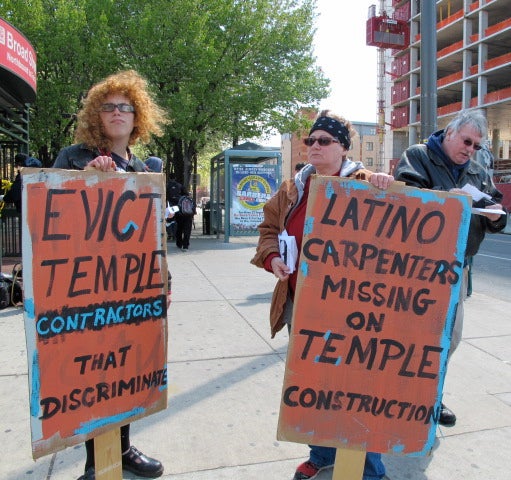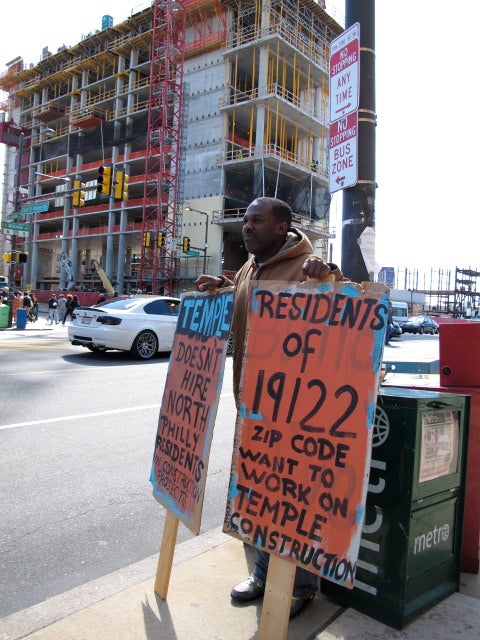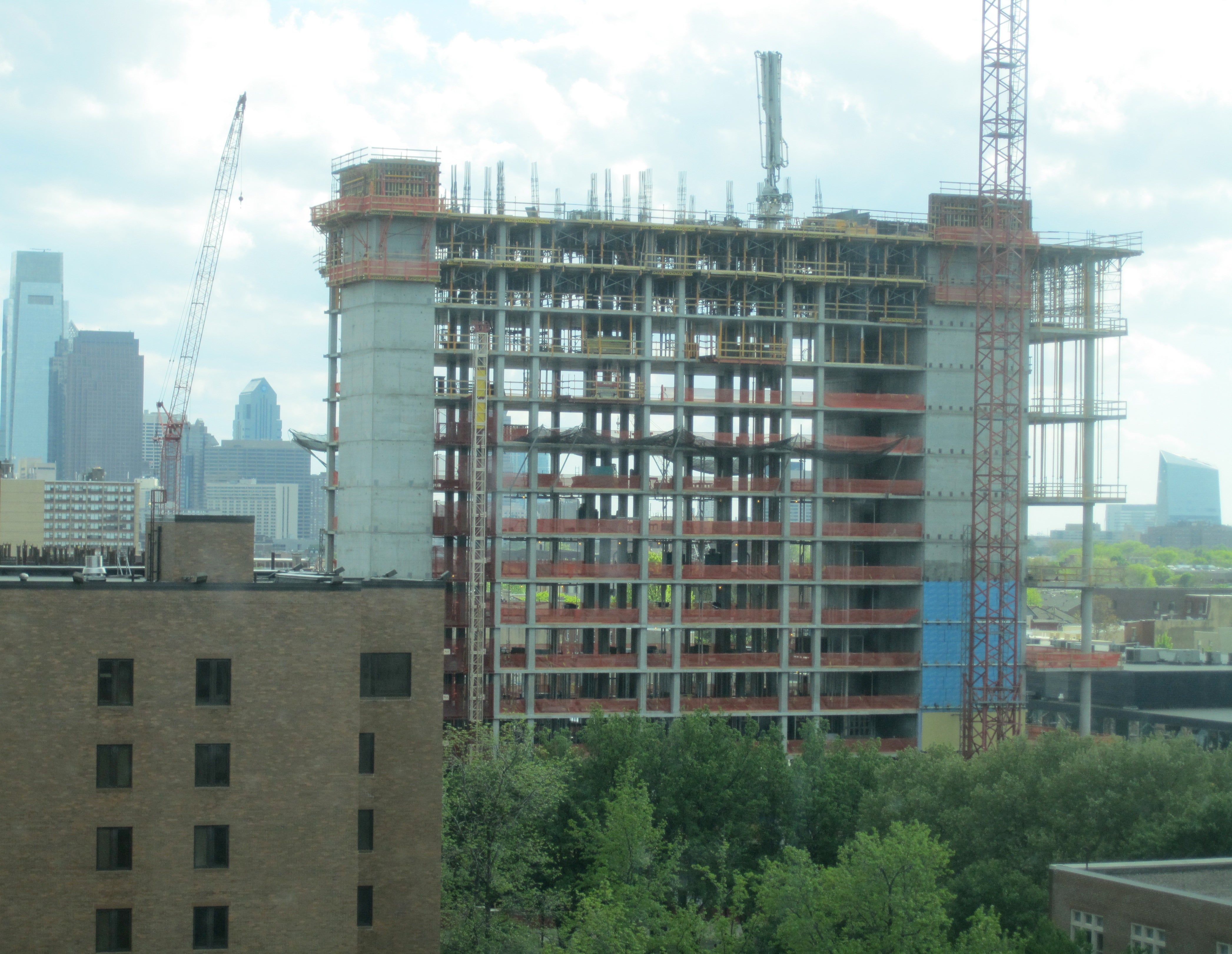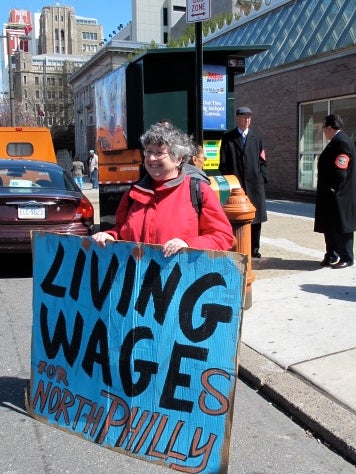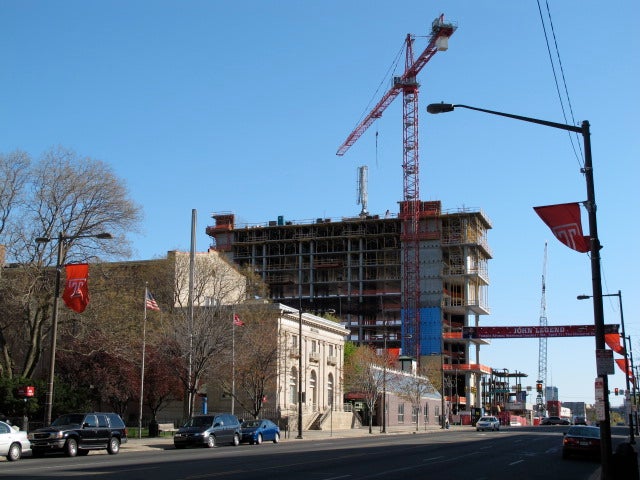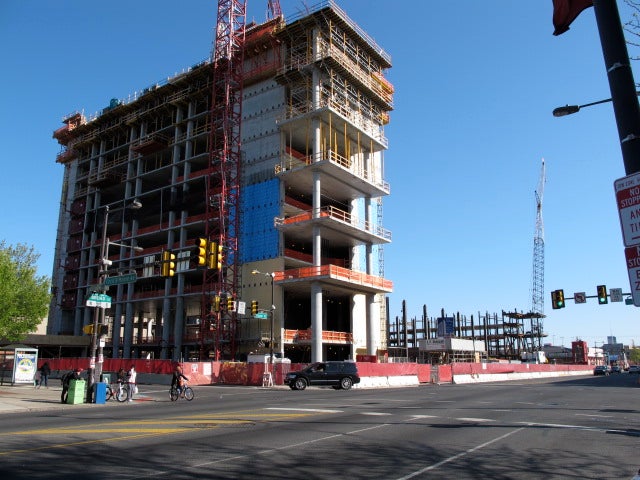Protestors claim hiring discrimination at Temple University construction site
By Christine Fisher
For PlanPhilly
For eleven weeks, protestors have been gathering at the corner of Broad Street and Cecil B. Moore Ave. in North Philadelphia. Every Monday, the group distributes flyers alleging hiring discrimination at a 24-story Temple University residence hall construction project.
The group wants to see more women, minorities and local workers hired on the site, and they are not taking ‘we’re trying’ or ‘we’ll get there’ for an answer from the Temple administration.
“Here you’ve got a situation where these are skilled jobs that pay a really good wage and yet there are very skilled people who aren’t getting these jobs,” said Philadelphia resident Laura Murphy.
Temple University and the Office of Economic Opportunity insist there is no hiring discrimination.
Temple reports that, over the life of the project, its minority and women involvement rates will meet or exceed citywide goals and that the university is working to monitor and increase female, minority and local workforce inclusion rates.
Temple has completed more than $1 billion in renovation and construction projects since 1991, and the university has lofty construction goals in place for the next several years. Currently it has $328 million slated for ongoing construction projects and another $446 million allocated for future projects. For all projects, Temple must agree to female and minority-hiring goals set by the city’s Economic Opportunity Plan.
For construction projects citywide, the Economic Opportunity Plan, which was signed by Mayor Michael Nutter in 2008, sets the minority construction workforce participation goal at 32 percent and the female workforce participation goal at seven percent.
According to James Creedon, senior vice president for construction, facilities and operations at Temple, the university is doing its best to meet these goals and ensure that women and minority owned business enterprises are employed on the Broad and Cecil B. Moore construction site.
“As of February, forty-one percent of the available funds for this project are going to be spent with minority and women owned firms, so $47 million,” Creedon said. “That’s a big stimulus for the community.”
According to February’s payroll data collected by the Urban Affairs Coalition, 415 people were employed on the Broad and Cecil B. Moore construction project. Of those workers, 128 were minority and three were women. Therefore, as of February minority workforce participation was approximately 30 percent, while female workforce participation was less than one percent.
“Our women number is low, but that’s the one that is a huge challenge to get to, but remember we’re only at 12 percent [project completion],” Creedon said. As more trades come on to the job site, he said he expects those numbers, especially the female workforce participation to increase.
Creedon said the payroll data also showed a 46 percent increase in African American workforce participation from January to February and a 66 percent increase in Latino employment in the same time span.
Those protesting the hiring discrimination are not satisfied with the numbers or Creedon’s response.
“When they say they have 30 percent minority participation, we know it’s all at the lowest levels of trade,” said Margarita Padin, a member of Carpenter Local Union 8 who has been leading the protests.
In addition, the protestors want more local workers hired on the site and want to see workforce diversity reflect the diversity of the neighborhood.
Padin said minority participation goals hovering around 35 percent are not high enough.
“The neighborhoods around here aren’t 35 percent minority,” she said. “They’re 35 percent white.”
“Temple needs to include people from the community in their work sites,” said John Graves who signed up to work on the site but never got a response.
“When you have quality trades people who live in the 19122, 19121, 19123 [zip codes], who aren’t getting work, you’re doing a disservice to the city,” he said.
Creedon said Temple is trying to hire from the 19121, 19122, 19123, 19125, 19130, 19133 and 19140 zip codes per the city’s ordinance and will continue outreach in these areas as the project advances.
These zip codes fall within Philadelphia’s 5th Council District, which City Council President Darrell Clarke represents. Clarke declined to comment for this article. Instead his office referred PlanPhilly to Angela Dowd-Burton, executive director of the Office of Economic Opportunity (OEO).
Temple recently joined forces with OEO to establish an economic opportunity review committee, which will track the project in an effort to ensure it meets workforce inclusion commitments.
Dowd-Burton said Temple’s female and minority inclusion goals exceed those set by the city.
“In fact their commitment was 33 percent participation from minorities, which means their plan is to exceed the goal that was established in the Economic Opportunity Plan for minorities, and they’re working on that similar commitment for women,” she said.
It is unclear what, if any, consequences Temple will face if female and minority participation goals fail to meet the city’s workforce participation goals, said Warren Davis, a member of Philadelphia Jobs with Justice and retired union leader who has been protesting at the construction site. Davis said he believes that, while there are supposed to be consequences, they are not enforced because deals between the university and various city agencies.
“We think that because of the lack of will to enforce the laws that are on the books, it’s incumbent on the community to get out here and demand [enforcement]” he said.
Davis said he has seen some changes on the construction site, but it is not enough to stop protesting.
“We’ve noticed they’ve hired one Latino here, one African American there – tokenism,” he said. He noted that at least one foreman on the construction site thanked the group for successfully pressuring the university and contractors to hire more minorities.
The group of protestors said they plan to continue distributing flyers on the corner of Broad and Cecil B. Moore..
In response to the continued protests, Creedon said the Temple will maintain its commitment to increase female and minority workforce participation and will continue to track payroll and hiring data.
“I think the data shows that we are making it happen,” Creedon said. “The data also shows that we have some gaps that we have to work on and that’s where we’re going to focus our resources in the next week or two.”
Contact the reporter at fisher.christine@temple.edu
WHYY is your source for fact-based, in-depth journalism and information. As a nonprofit organization, we rely on financial support from readers like you. Please give today.



